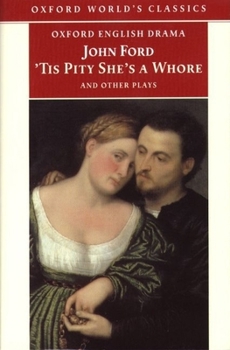'Tis Pity She's a Whore and Other Plays: The Lover's Melancholy; The Broken Heart; 'Tis Pity She's a Whore; Perkin Warbeck
Select Format
Select Condition 
Book Overview
Ford wrote darkly about sexual and political passion, thwarted ambition, and incest. This selection of four plays also shows his ability to portray the poignancy of love as well as write entertaining comedy and create convincing roles for women. Setting Ford's earliest surviving independently written play, The Lover's Melancholy, alongside his three best-known works, The Broken Heart, 'Tis a Pity She's a Whore, and Perkin Warbeck, this edition includes...
Format:Paperback
Language:English
ISBN:0192834495
ISBN13:9780192834492
Release Date:September 1999
Publisher:Oxford University Press, USA
Length:416 Pages
Weight:0.75 lbs.
Dimensions:1.0" x 7.7" x 5.1"
Customer Reviews
3 ratings
'Tis Pity It's Rarely Staged!
Published by Thriftbooks.com User , 14 years ago
"'Tis Pity She's a Wh***" is the best known of John Ford's eight surviving plays, and the only one that 'holds the boards' these days, the only one you're likely to see even at a Shakespearean festival. That's our loss. "Pity" is a bloody spectacle, an uproarious tragedy, an outrageous assault on the pieties and conventions of our times as much as of 1625, when it was first staged. It's as well crafted and sonorous in language as Shakespeare's Othello or Webster's White Devil, plays with which it has a strong affinity. It regales us with murders aplenty, ecclesiastical corruption and incest not redeemed at the last moment by the discovery of any 'real' identity of one of the incestuous couple. It's as bawdy and sardonic as the gnarliest of Elizabethan/Jacobean drama, and it's both suspenseful and fast-paced. Literary critics have spilled their ink over the morality of its author, about whom as little is known as about Shakespeare. What particularly must have stunned a Jacobean audience was the frank avowal of atheism on the part of the central character, an atheism that nothing else in the play cancels or repudiates. Ford must have been a brave, or a protected, playwright ... or else should we suppose that London audiences in 1625 were more receptive to apostasy and moral anarchy than those in America today? Reading a play is always a thin gruel, and the language of Ford's plays will be challenging for many people in 2010. Luckily there are ample notes, a glossary, and an insightful introduction to aid the brave reader. The first two plays in this Oxford edition -- "The Lover's Melancholy" and "The Broken Heart" are standard Elizbethan/Jacobean fare, tales of thwarted love, rivalry, and revenge. They also are well constructed as theater pieces, and their language is vigorous, but I doubt that a modern audience would find them entertaining. Pure villainy is no longer a shock to us. The last play in the collection is "Perkin Warbeck", and this was the piece that attracted my interest to Ford. I had just finished reading "The Perfect Prince" by Ann Wroe, a history of the reign of Henry VII focusing on the Yorkist Pretender to the throne, a young man who claimed to be Richard, the second son of Edward IV supposedly murdered in the Tower of London by Richard III. "Prince" Richard received credence and support from disaffected lords in Ireland, from adamant Yorkists in England, from the Hapsburgs Maximilian and Philip, and from James of Scotland, who arranged his marriage to the high-born Lady Katherine Gordon. Henry VII took the threat quite seriously, hiring multiple agents to 'disprove' the young man's identity. Those agents eventually asserted that the Pretender was really Perkin Warbeck, the son of a lowly boatman. Richard/Perkin invaded, was captured, imprisoned, and finally executed. A confession that he was truly Perkin was extracted from him and circulated. Apparently his story was well remembered more than a century later, when Ford's play
Book review
Published by Thriftbooks.com User , 14 years ago
I got my book fairly promptly, a little over a week after ordering it. It came in good condition, with only a small wrinkle on the front cover. There were no markings in it, or torn pages. I was very, very pleased with my item and it's delivery! yay!
Great books
Published by Thriftbooks.com User , 17 years ago
All of these in the Oxford English Drama series are well worth the money. Thank heavens (and Oxford) that they are in print at this price. I am collecting them all. I've got a shelf of them now. Jane Smiley, writing on something else, said one doesn't need Shakespeare's contemporaries to recognize his greatness. I feel that misses a giant point: so much of our understanding and enjoyment of Shakespeare can be enriched by reading the Bard's contemporaries. In fact, if we want to get very deep into any "Jacobethan" drama we need exposure to a bunch of it. Besides, and here is the great part -- much of it is very good. I saw a wonderful production of The Duchess Of Malfi this summer and took my Oxford paperback along for consulting -- not that it was required to enjoy the show. Oh, and the further perk is that we can read Perkin Warbeck and wonder just what the heck Eliot meant by calling it a perfect play! Now, that is what I call fun.





